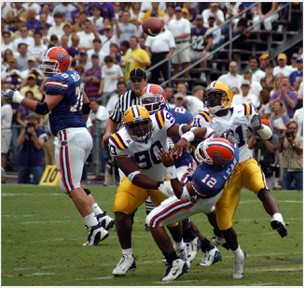So is Sports
Betting Legal, or What?
Sports betting is definitely
on of the favorite pastimes in America, says Marshall.
 Fans
of all different sports can add to the excitement inherent in a
match by putting some money down and hopefully making a bit on a
successful wager. These days, it’s not too hard to find a chance
to put some money down on virtually any kind of sport, from
tennis to the National Football League.
Fans
of all different sports can add to the excitement inherent in a
match by putting some money down and hopefully making a bit on a
successful wager. These days, it’s not too hard to find a chance
to put some money down on virtually any kind of sport, from
tennis to the National Football League.
The prevalence of sports betting sites
on the internet has mean that sports betting looks as though it
is perfectly fine under the law as well as by any other measure.
The fact remains, however, that in most cases betting on sports
is frowned on by the law and there are very few jurisdictions in
North America that allow gamblers to place sports bets legally.
The main exception to the rule here are
sports books in Las Vegas. The city is known as the place to
gamble in North America, and it stands to reason that the deep
pockets of the casinos and books there would provide some
measure of insulation for their operations that is not extended
across the country. In Las Vegas a sport bettor can place best
on Wimbledon, the World Series, March Madness, and any other
type of sports event and do so without any fear of participating
in activities that are not endorsed by the law.
As far as other jurisdictions go, there are very few sports
betting activities that can be undertaken legally. The
exceptions are government sponsored sports lotteries and
pari-mutuel sports activities.
Pari-mutuel sports include dog racing
and horse racing. The idea is that the government gets a cut of
the overall amount of the bets, not just the winnings of the
gambler. Ostensibly, the government endorses these sports and
not others because there is less chance of cheating, or
compromising the spirit of sport. Any rational observer should
be able to see that in fact there is just as much of a chance of
cheating in these sports as there is in any other, and that the
only real difference is the assured cut of the take that the
government has.
The same principle of hypocrisy extends
to government sponsored sports lotteries. These usually take the
form of parlay cards, and the odds of winning Sports Action
tickets are worse than odds offered at casinos. Again, the
government is really only assuring itself of profit on the
activity, not addressing the concerns so often touted to
discourage gambling in other forms.
So what about all of those internet
sites? Well, some of them are run offshore, based in countries
which don’t endorse the hypocritical standards so prevalent in
North America. Americans using these sites must still be
careful, though, as a bill attached to the Safe Port Act of 2006
effectively limits legal activity on these sites as well.
It’s a proven fact that no matter how
the government tries to portray it or whatever the brush they
choose to paint it with, sports betting is here to stay. It’s
important that all sports bettors point out the inherent
hypocrisy in the government’s approach to sports gambling. More
importantly, remember that when you place a bet you might get in
trouble with the law. This is a rare occurrence as almost
everyone participates at one time or another, but it is best to
be on the cautious side.
Marshall
 Published on 08/17/2007
Published on 08/17/2007
More in Betting School:
E-mail:
news@ogpaper.com